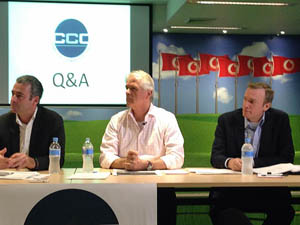Australian telcos call for ACCC to rein in Telstra

The Competitive Carriers' Coalition (CCC) has said that the moves to structurally separate Telstra and improve competition in the telecommunications industry in the last five years have not been as successful as they had once hoped.
A revelation last week from an Australian Competition and Consumer Commission (ACCC) report showed that Telstra's retail staff had access to information about Telstra wholesale customers, and could and did cancel wholesale customer orders, in violation of the terms of the structural separation undertaking (SSU).
And despite the structural separation of the company, the CCC said that Telstra continues to enjoy 60 percent of industry revenue, including 85 percent of fixed-line revenue and 45 percent of mobile revenue.
The CCC said that Telstra is leveraging its advantages and monopoly profits in the fixed-line industry to subsidise its activities in other, more competitive markets, and this will continue even with the rollout of the National Broadband Network (NBN), thanks to the AU$11 billion deal that Telstra signed with the government to move its customers onto the NBN.
In the lead-up to the September election, the CEOs of three of Australia's biggest telecommunications companies, iiNet, Vodafone Australia, and Macquarie Telecom, called on the government and the ACCC on Wednesday to review the policy and regulatory environment to shift the advantage away from the incumbent Telstra and as a result improve competition and pricing for telecommunications services in Australia.
Macquarie Telecom CEO David Tudehope said that the SSU gave the ACCC a lot of opportunity to intervene to make Telstra act to meet the requirements of being a separated company, but last week's report raised questions as to whether Telstra could be forced to comply with the SSU.
"It's an open question as to what happens if Telstra refuses, if it empowers the commission to force Telstra to do certain things. On paper, it should have the power to force them to do it, but we've seen in the past that these things are usually resolved around the table through negotiation," he said.
"We've been saying for 10 years this has been going on and been told it is not, and been told it is just an apparition or one person doing the wrong thing. Clearly, this has been built in into the systems inside Telstra to allow this information to be available to retail."
The ACCC's next step to go about forcing Telstra to separate its wholesale and retail systems and ensure retail staff have no access to wholesale systems will be a case study for the wholesale customers, Tudehope said, as to whether the ACCC has the powers it needs.
"If the regulator can't resolve those things, then maybe we will need to go back and have another look."
iiNet CEO Michael Malone said that part of the problem in the fixed-line business is a lack of transparency around the regulation of costs for accessing Telstra's wholesale DSL service. The ACCC mandated prices for the wholesale DSL service in regional Australia well above what iiNet had suggested, stating that it is relying on copper maintenance costs disclosed to the ACCC by Telstra, but not revealed to anyone else. iiNet asked the ACCC to reveal the cost model, but was rejected.
"We were being asked to comment on Telstra's claimed costs, but we weren't permitted to look at the models that Telstra [gave] the ACCC. How are we supposed to give meaningful feedback on whether the pricing is fair and reasonable when we don't have the data?"
With a number of pricing reviews scheduled for next year, Malone said the ACCC's decision in this instance was worrying.
"The early signs in that are not good," he said. "We definitely need to get more transparency."
Malone said the ACCC also needs to review backhaul prices, particularly in the NBN world. He said that pricing for international capacity for iiNet has gone down from AU$130 per megabit to AU$8 per megabit, and is expected to decline even further, but that drop has not been seen in domestic backhaul.
"Against that backdrop, you've got the NBN at AU$20 per megabit to get traffic across the street, and Telstra off-net customers are at AU$35 per megabit," he said.
"This is a huge impediment, and you're now going to get customers faster and faster internet access and tax them if they use it. It ends up being a disproportionate tax as well, because for companies like iiNet and Internode, our customers have much higher usage than Telstra customers or Optus customers.
"That's an area the ACCC should address urgently."
Vodafone Australia CEO Bill Morrow said that the mobile industry, similar to the fixed-line industry, needs to review the input pricing components for offering services and look for the best way to reduce those costs, including increasing shared mobile towers. But he stressed that while much of the focus of the campaign is directed at Telstra, the incumbent is not the target.
"There are elements that relate to Telstra. The target is not Telstra. The target is bringing Australians a very different level of competitive offering than they have today. We do need to look at pricing as to whether or not this is right and fair, and how much that stifles competition."
